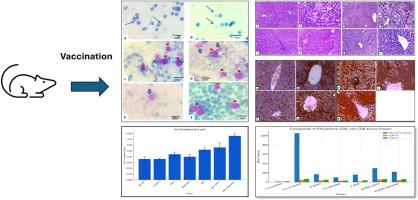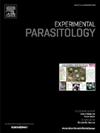Niosomes as a vehicle for excretory/secretory antigens enhance immunization efficacy of Toxoplasma gondii vaccine
IF 1.6
4区 医学
Q3 PARASITOLOGY
引用次数: 0
Abstract
Till now, there is no well-established vaccine for toxoplasmosis in humans. This study evaluated the efficacy of niosomes to enhance the immunogenicity of Toxoplasma gondii excretory/secretory antigens (ESAs) vaccine in mice. The mice were divided into the following groups: group I (naïve), group II (naïve challenged), group III (alum), group IV (niosomes), group V (ESAs), group VI (ESAs and alum) and group VII (ESAs-loaded niosomes). All immunized mice received three doses of vaccine intraperitoneally two weeks apart. Two weeks later, mice were challenged with intraperitoneal injection of 103 viable tachyzoites of virulent RH strain. Parasitological, histopathological, and immunological studies were done. ESAs-loaded niosomes offered the best protection as they significantly decreased the mean parasitic count in liver and spleen with reduction rates of 85 and 90 %, respectively. Also, it reduced efficiently the inflammation and parenchymal injury in liver with intense iNOS immunostaining expression. In addition, it was effective in stimulation of humoral and cellular immune responses evidenced by the high significant anti-Toxoplasma IgG, increasing of CD4+ and CD8+ percentages by flowcytometry and serum IFN-γ levels. Therefore, niosomes were proved to be promising vaccine candidates due to enhancing the antigenicity of ESA and their long acting antiparasitic effect.

作为排泄/分泌抗原载体的Niosomes增强了弓形虫疫苗的免疫效果。
到目前为止,还没有针对人类弓形虫病的成熟疫苗。本研究评价了乳质体对刚地弓形虫排泄/分泌抗原(ESAs)疫苗免疫原性的增强作用。将小鼠分为1组(naïve)、2组(naïve攻毒)、3组(明矾)、4组(niosome)、5组(ESAs)、6组(ESAs +明矾)和7组(ESAs加载niosome)。所有免疫小鼠间隔两周腹腔注射三剂疫苗。2周后,小鼠腹腔注射103个有活力的RH毒株速殖子。进行了寄生虫学、组织病理学和免疫学研究。负载esas的niosome提供了最好的保护,因为它们显著降低了肝脏和脾脏的平均寄生虫计数,分别减少了85%和90%。并能有效减轻肝脏炎症和实质损伤,iNOS免疫染色表达强烈。此外,它还能有效刺激体液和细胞免疫反应,其抗弓形虫IgG显著升高,流式细胞术检测CD4+和CD8+百分比升高,血清IFN-γ水平升高。因此,乳小体可以增强ESA的抗原性,并具有长效抗寄生虫作用,因此被证明是有希望的疫苗候选物。
本文章由计算机程序翻译,如有差异,请以英文原文为准。
求助全文
约1分钟内获得全文
求助全文
来源期刊

Experimental parasitology
医学-寄生虫学
CiteScore
3.10
自引率
4.80%
发文量
160
审稿时长
3 months
期刊介绍:
Experimental Parasitology emphasizes modern approaches to parasitology, including molecular biology and immunology. The journal features original research papers on the physiological, metabolic, immunologic, biochemical, nutritional, and chemotherapeutic aspects of parasites and host-parasite relationships.
 求助内容:
求助内容: 应助结果提醒方式:
应助结果提醒方式:


